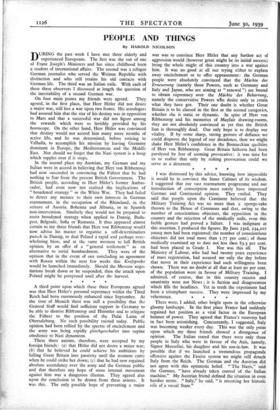PEOPLE AND THINGS
By HAROLD NICOLSON
DURING the past week I have met three elderly and experienced Europeans. The first was the son of one of Franz Joseph's Ministers and has since childhood been a student of international affairs. The second was a refugee German journalist who served the Weimar Republic with distinction and who still retains his old contacts with German life. The third was an Italian exile. With each of these three observers I discussed at length the question of the inevitability of a second German war.
On four main points my friends were agreed. They agreed, in the first place, that Herr Hitler did not desire a major war, still less a war upon two fronts. His astrologers had assured him that the star of his destiny was in opposition to Mars and that a successful war did not figure among the rewards which were so lavishly provided by his horoscope. On the other hand, Herr Hitler was convinced that destiny would not accord him many more months of active life, and he was determined, before retiring to Valhalla, to accomplish his mission by leaving Germany dominant in Europe, the Mediterranean and the Middle East. Nor should we forget that the Nazi system is a hoop which topples over if it stops.
In the second place my Austrian, my German and my Italian were in accord in believing that Herr von Ribbentrop had now succeeded in convincing the Fithrer that he had nothing to fear from the present British Government. The British people, according to Herr Hitler's former Ambas- sador, had even now not realised the implications of " broadened strategy " or the White War. They had failed to detect any menace to their own interests in German rearmament, in the occupation of the Rhineland, in the seizure of Austria, Bohemia and Albania, or in Spanish non-intervention. Similarly they would not be prepared to resist broadened strategy when applied to Danzig, Buda- pest, Belgrade, Sofia or Rumania. It thus appeared almost certain to my three friends that Herr von Ribbentrop would now advise his master to organise a self-determination putsch in Danzig, to deal Poland a rapid and perhaps over- whelming blow, and at the same moment to lull British opinion by an offer of a " general settlement " as an alternative to aerial bombardment. They were of the opinion that in the event of our concluding an agreement with Russia within the next few weeks this Kra( tprobe would be launched immediately. Should the Moscow nego- tiations break down or be suspended, then the attack upon Poland might be postponed until after thr harvest.
* * * *










































 Previous page
Previous page